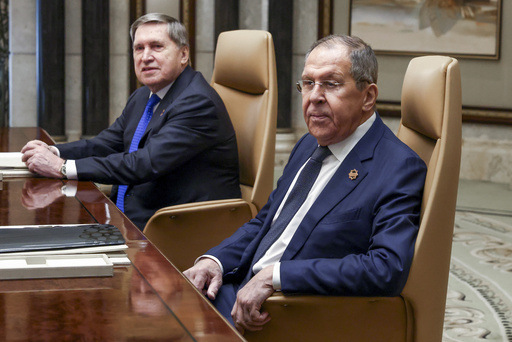In Riyadh, Saudi Arabia, senior officials from the U.S. and Russia engaged in their most thorough high-level discussions since the onset of the conflict in Ukraine nearly three years ago, meeting for four hours. This meeting was marked by a statement from former President Donald Trump, who suggested that the confrontations in Ukraine were primarily the fault of Kyiv, expressing frustration with Ukraine’s exclusion from the talks.
Trump was vocal about his dissatisfaction, emphasizing that the conflict never should have escalated and that Ukraine’s leaders should have pursued negotiations with Russia prior to the deployment of troops in 2022. From his Florida residence, he told reporters, “You should have never started it. You could have made a deal.” His remarks signaled a potential shift that could jeopardize relations between the U.S. and its European allies, while also undermining Washington’s credibility with Ukraine and other nations reliant on American support within NATO and beyond.
Under Joe Biden’s tenure as president, the U.S. and Europe focused significantly on isolating Russia and maintaining the international order established after World War II. In the recent talks, led by U.S. Secretary of State Marco Rubio and Russian Foreign Minister Sergey Lavrov, a commitment was reached to restore staffing levels at embassies in both Washington and Moscow. This is seen as a crucial step toward fostering Ukraine peace discussions and reinstating global economic cooperation, with mentions of potential joint energy projects emerging from the talks.
The discussions marked a pivotal attempt to move past a significant diplomatic freeze that began in the wake of Russia’s annexation of Crimea in 2014 and reached an all-time low following the invasion of Ukraine. This meeting, occurring shortly after Trump’s conversation with Putin, was the first substantive in-person dialogue between the top diplomats from both nations since January 2022. Following the talks, Lavrov remarked that both countries agreed on expediting the appointment of new ambassadors, with plans for senior diplomats to gather soon to mitigate barriers affecting their embassies’ operations.
The decline in diplomatic personnel from both countries started before the full-scale invasion of Ukraine, largely due to retaliatory expulsions in response to various geopolitical events including the Parsons spy poisoning incident. When asked about the U.S. stance on these historical cases, Rubio acknowledged the necessity of diplomatic engagement to foster a resolution, stating that normalizing relations was essential for progressing toward ending the conflict.
Both nations agreed to create high-level working groups to explore a negotiated settlement for the ongoing conflict. While the timeline for these meetings had not been disclosed, both parties indicated a sense of urgency regarding future discussions. Important topics under consideration include territory disputes and security assurances, which were noted by Trump’s national security advisor, Mike Waltz. Rubio mentioned the formation of a specialized team dedicated to outlining the possible terms for ending the conflict.
A significant takeaway was Russia’s reaffirmation that it would not agree to any NATO troops participating in a potential peacekeeping mission in Ukraine, emphasizing its position that Ukraine’s NATO aspirations pose a notable security challenge. Lavrov reiterated, “The deployment of troops from NATO member countries will not change anything and will certainly be unacceptable for us.”
Although neither Ukraine nor European nations were included in the Riyadh discussions, U.S. officials clarified that they would not be sidelined in future negotiations. Both Rubio and Waltz insisted that ongoing communication with Ukraine and European partners would be crucial in the peace process. Notably, Trump spoke with Ukrainian President Volodymyr Zelenskyy following his conversation with Putin, and U.S. officials had been in dialogue with Ukrainian leaders to reinforce cooperation.
Despite these reassurances, Zelenskyy’s irritation over being excluded from the Riyadh meeting led him to cancel his planned visit to Saudi Arabia. Observers noted that the tone of the negotiations appeared to favor Russia, with concerns voiced by experts regarding the nature of these discussions and whether theyrepresented genuine negotiations or concessions from the U.S. to Russia.
When questioned about the potential for lifting U.S. sanctions on Russia, Rubio pointed out that ending any conflict would necessitate concessions from all parties involved, without specifying what those might entail. As for the prospect of Lavrov’s removal from the sanctions list, Rubio stated that such discussions had not yet reached that stage.
In an interesting development, Kirill Dmitriev, the head of Russia’s Direct Investment Fund, proposed that the two nations should look into collaborative energy projects, indicating a possible area for future cooperation. Rubio echoed this sentiment, suggesting that successfully resolving the conflict might unlock “incredible opportunities” for partnership, benefiting both nations and potentially enhancing long-term relations. However, specifics about these opportunities were not divulged.
In summary, this recent diplomatic engagement marked a significant attempt to address the complexities of U.S.-Russia relations in the context of the ongoing conflict in Ukraine,underscoring the balance of diplomatic outreach needed to pave the way for potential peace in the region.




